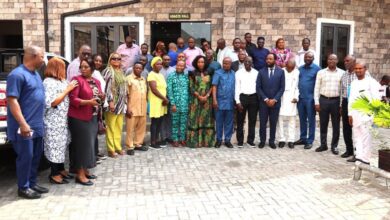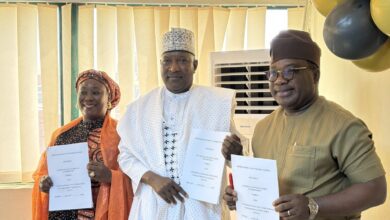
The Minister of Works and Housing, Babatunde Fashola, has charged state governments to simplify the process of land acquisition in their states, explaining that citizens would need land as they prefer to build their houses by themselves because buying of houses built by government do not interest them.
Director, Press and Public Relations of the ministry, Ms. Blessings Lere- Adams
disclosed this in a statement issued on Friday, July 29, 2022.
TheFact Daily gathered that houses sold by government under the National Housing Program (NHP) were considered exorbitant. For example, a one bedroom bungalow; with one bathroom for sale under the NHP in Kano costs 9,268,751.8 naira, an amount citizens feel can build them a better house.
According to the statement, Fashola gave the charge in Sokoto, Thursday at the eleventh Meeting of the National Council on Lands, Housing and Urban Development with the theme “Housing Our People, By All of Government and All Our People.”
The Minister noted that land title documents were important to facilitate housing delivery and housing finance that government at all levels should pay more attention to, in addition to the process involved in granting permits for construction and approvals.
He explained that citizens would need land as they prefer to build their houses by themselves because buying of houses built by government do not interest them, as such simplifying the processes would help in that regard, noting that housing provision is a collaborative effort by all levels of government and the private sector.
“We must therefore reform the process that governs allocation of land and issuance of title documents such as Certificates of Occupancy” he said
Accordingly, the Minister said that the bulk of the work to be done on lands lie with the States because of their almost total control of land by virtue of the Land Use Act.
The Minister also encouraged State Governments who were yet to digitize their land acquisition to do so in order to facilitate the issuance of title document as well as encourage investors who might need land to establish one business or the other.
On the payment of rent in advance, Fashola said “I hold a strong view that asking for 2 to 3 years rent in advance from working class people (as distinct from corporate tenants who may prefer to pay in advance) does more harm than good to all concerned and to the economy,”
He urged that State governments and Lawmakers to come up with policy that could ensure payment of rent is made after collecting salary, saying it would be a most revolutionary intervention rent payment system in the country.
“This is possible if we try and this will give the fullest possible expression to the theme of this meeting which is “Housing Our People, By All of Government and All Our People.” he said
Fashola also informed the delegates that the National Housing Programme initiated by Federal Ministry of Works and Housing at the onset of the Muhammadu Buhari led administration has been completed and handed over to the beneficiaries.
He noted that the programme has begun to deliver the objectives for which it was created such as owning a house and job creation to lift people out of poverty through the engagement of engineers, builders, masons, and food vendors to work on the various sites across 34 states and FCT.
“The construction sites have been and remain centres of supply for building materials and other commodities. Many people who hitherto were unemployed have had their dignity restored because they can leave home every day saying to their families – I AM GOING TO WORK,” he said.
The Minister also stated that many houses have been completed and are now being handed over to the beneficiaries who follow the allocation procedure set out in the National Housing Programme web portal.
For flexibility and easy purchase of the houses, Fashola stated that a Rent-to-Own option has been introduced into the acquisition and sale.
In his address, the Governor of Sokoto, Rt Hon, Aminu Waziri Tambuwal urged delegates to carefully study the presentation that has been put together by stakeholders to enable them make the most viable and effective decision which could become a model of preference in the built environment.






